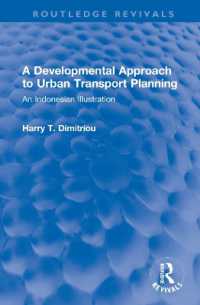Full Description
Pedagogical Reflections on Learning Languages in Instructed Settings is intended to provide the latest pedagogical reflections that derive from research in a variety of key areas within the discipline of language learning. Thus, this volume aims at helping practising language teachers to update their teaching methodology.The book has fifteen chapters that are grouped around five sections. The first section of the book includes three chapters, which outline past approaches to language learning and highlight advances in our understanding of how languages are likely to be learned and taught. These three chapters provide the theoretical grounding for the rest of the volume by discussing outstanding concepts in the language learning field, namely: those of eclecticism (Chapter 1), communication (Chapter 2), and learner autonomy (Chapter 3). The second section of the book contains three chapters, which explore new directions in the field that have recently caught the attention of language researchers and practitioners, namely: the Information and Communication Technology (ICT) in language learning (Chapter 4) the use of language corpora (Chapter 5) and finally, the use of the portfolio as a new assessment tool responding to new pedagogical demands (Chapter 6). The third section of the book consists of three chapters, which discuss the role of learners' individual variables such as affect (Chapter 7), learning styles (Chapter 8), and learning strategies (Chapter 9), crucial for understanding the nature of language learning. The fourth section of the book has five chapters and provides insights into understanding the nature of the four language skills, that is to say, listening (Chapter 10), speaking (Chapter 11), reading (Chapter 12) and writing (Chapter 13). This section also addresses the issue of assessment with the aim of increasing awareness on the duality teaching/assessing and its pedagogical dimension (Chapter 14). The book concludes with the fifth section, which includes a single chapter, that pulls all aforementioned topics together and highlights connections to a student-centred approach, which involves a reformulation of language teachers' teaching practices (Chapter 15).








